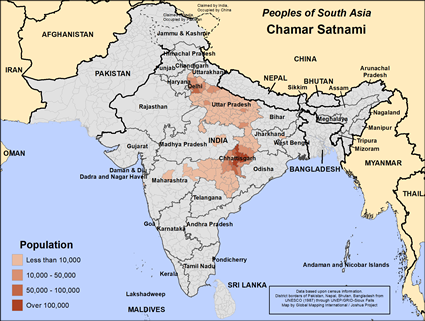Satnami in India

Photo Source:
Anonymous
|

Map Source:
People Group data: Omid. Map geography: UNESCO / GMI. Map Design: Joshua Project
|
| People Name: | Satnami |
| Country: | India |
| 10/40 Window: | Yes |
| Population: | 1,792,000 |
| World Population: | 1,792,000 |
| Primary Language: | Hindi |
| Primary Religion: | Hinduism |
| Christian Adherents: | 1.66 % |
| Evangelicals: | 0.00 % |
| Scripture: | Complete Bible |
| Ministry Resources: | Yes |
| Jesus Film: | Yes |
| Audio Recordings: | Yes |
| People Cluster: | South Asia Dalit - Chamar (Bhambi) |
| Affinity Bloc: | South Asian Peoples |
| Progress Level: |
|
Introduction / History
The Chamar people are also known as Bhambi, Asadaru, Khalpa, Machigar, Mochi, and Rohit. The origins of the name "chamar" come from their leather work. Like most major Hindu castes, the Chamar have subgroups. One of their subgroups is the Satnami.
The Satnamis were established by a Hindu guru by the name of Ghasidas who lived from 1756 to 1850. Satnami Chamars live mainly in Chandhgarh, Delhi and Uttar Pradesh.
What Are Their Lives Like?
In traditional Hinduism, those who deal with "dead" matter are among the low status communities. This is especially true for those who work with leather, which comes from cattle, which Hindus consider holy. The Satnami's main occupation is manufacturing shoes and chappals from finished leather. Satnami Chamars are among the largest communities in the Hindu world and have very low status. This low status in Indian-Hindu tradition makes them undesirable and unworthy of any sort of consideration or provision by society. This translates into frequent joblessness, lack of education and lifelong poverty. Traditional upper caste members would avoid their shadow, though this would be rare today.
Some are engaged in daily-wage labor and petty business. Satnami women are also involved in agricultural work, animal husbandry and various economic activities.
The Satnami practice monogamy in marriage, meaning one man marries one woman. They allow remarriage for widowers but not for the widows. The dead body of a bachelor is buried lying on its back with the head facing the south, whereas others are cremated, and their mortal remains are immersed in sacred water. They offer rice balls to the dead and to ancestors on the tenth day after death.
What Are Their Beliefs?
The Satnami Chamar are Hindu. They follow the teachings of Ghasidas, a guru who taught that all communities are equal. Ghasidas emphasized truth and equality much like the Sikhs. He told his people to throw away their idols and listen to a white man who comes to them with a large book. For a time, they listened to Christian missionaries, but that movement has since fizzled out.
What Are Their Needs?
There is a slightly higher degree of responsiveness to the gospel among the Satnami Chamars than among other low castes. There is a church planting movement underway among Satnami in several districts across India, but they are far from unreached. It will take many workers to get the gospel to all Chamar communities throughout India.
Prayer Points
Pray for God to send hundreds of Christian workers among them and meet their spiritual and physical needs.
Pray for the Satnami people to break through the caste barrier and be accepted by other communities.
Pray that these Satnami believers will be salt and light to other communities throughout India.
Pray that church planting will multiply across all Chamar communities.